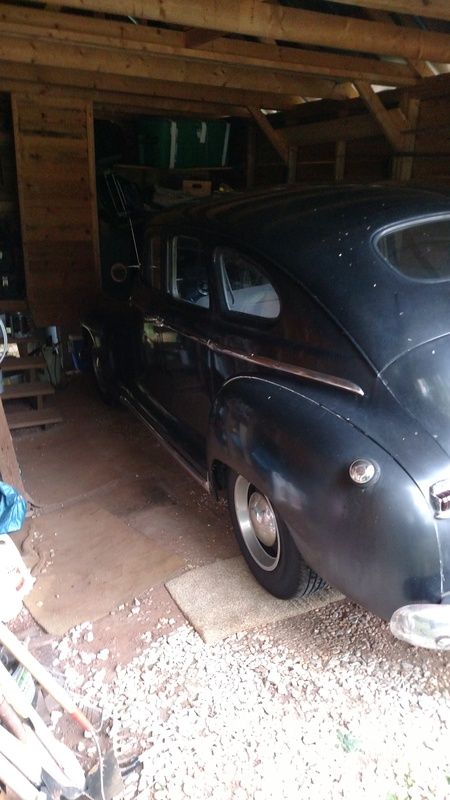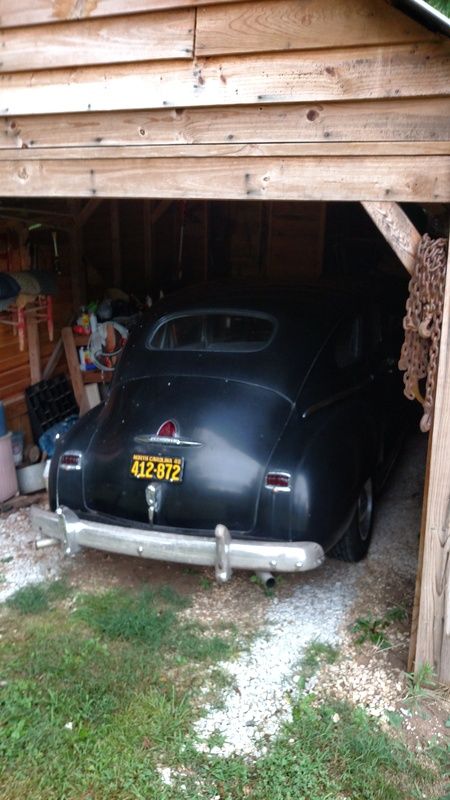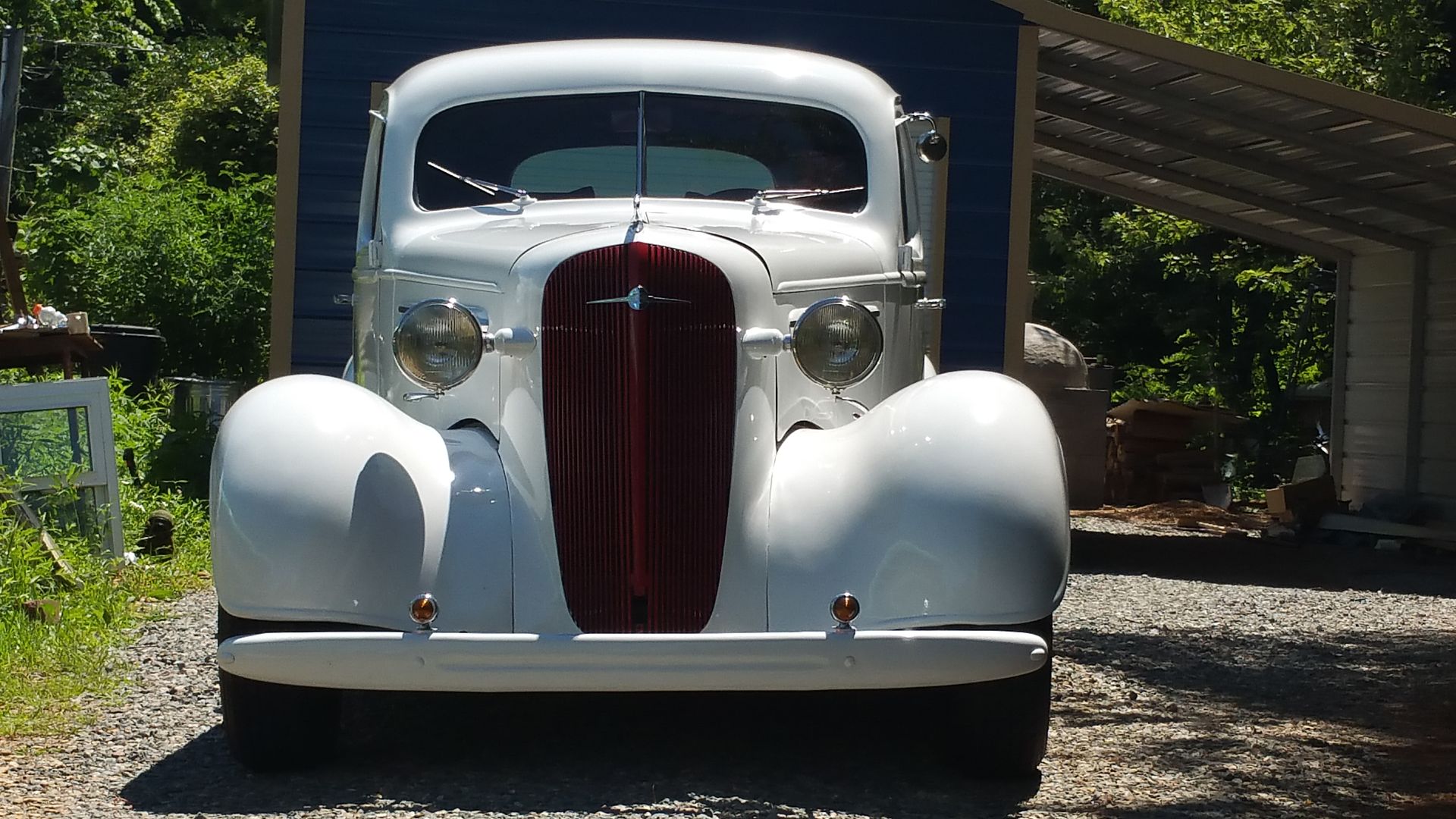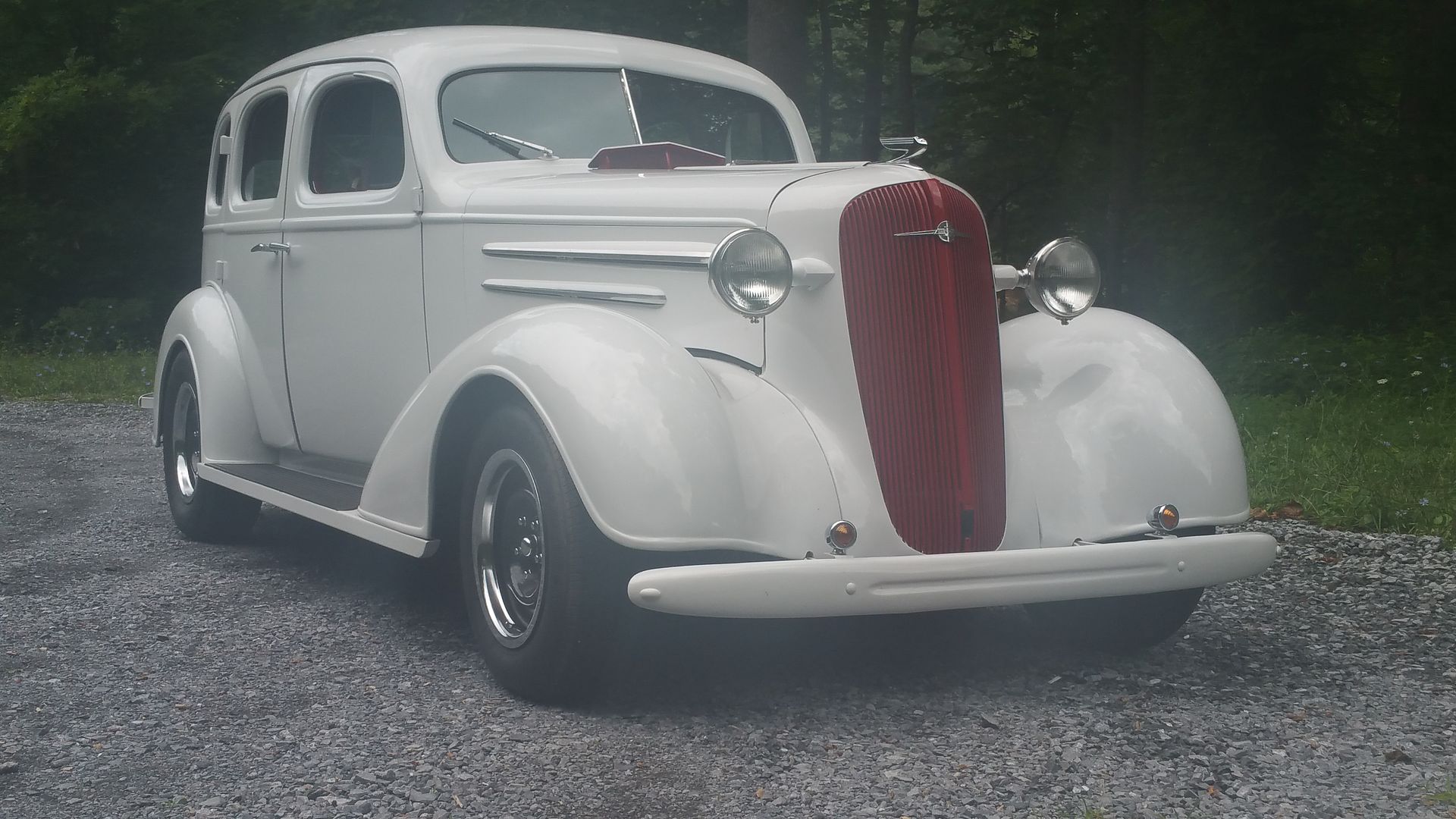You are right about the Chrysler engines! Back in the late 80s, my boss had a 42 Dodge Sedan, we painted OD with white stars. It had a bad rod knock at anything over 40 mph. He was a great boss, but put a whole new meaning to the word cheap. We pulled the oil pan and did the old emery paper and new bearings dodge! The car ran great, and was still running a decade latter after he passed away! I wonder if it just might still be running with that fix?It is a myth that old engines need non detergent single weight oil. Multigrade detergent oil has been available since 1951 and was the default choice in every garage and dealership in the fifties and sixties. So chances are any car made after 1950 has never used anything else.
I worked in a garage in the sixties and did many oil changes. Practically all of them with 10W30. We kept 30 non detergent bulk oil for cheapskates with old oil burning klunkers but they never changed their oil. Just poured more in when the crankcase was low and bought $2 worth of gas.
Chrysler flatheads are well behaved engines and hardly ever make bad noises or show signs of distress even when badly worn. They just get slower and harder to start.
I think the mechanics were astonished when they took Lizzie's engine apart, that it even ran. I know other cases with similar engines that were rebuilt and the owners were surprised by the new found power. They didn't know how bad the engine was because it gave very little sign. I know one guy with a 41 Plymouth coupe who wanted to change the rear axle ratio or install a 4 speed until he had the engine rebuilt, the new found power took away all need to make other changes.
If your oil pressure is low and your compression is low you should think about doing something about it. But if you choose not to, it may run a long time if you baby it as I said before.
Want to buy or sell something? Check the classifieds
-
The Fedora Lounge is supported in part by commission earning affiliate links sitewide. Please support us by using them. You may learn more here.
You are using an out of date browser. It may not display this or other websites correctly.
You should upgrade or use an alternative browser.
You should upgrade or use an alternative browser.
Vintage Car Thread - Discussion and Parts Requests
- Thread starter FedoraGent
- Start date
LizzieMaine
Bartender
- Messages
- 34,140
- Location
- Where The Tourists Meet The Sea
Here's what they found inside my engine when they broke it down -- all rings shattered, and one piston skirt broken off. The other chunk was in the oil pan.

I drove it 300 miles like this, adding a quart of oil and some Bardahl every fifty miles or so. Oooweee.
I drove it 300 miles like this, adding a quart of oil and some Bardahl every fifty miles or so. Oooweee.
Bardahl should hire you as their spokes person! "Bardahl, for when your piston skirt and rings are missing!"Here's what they found inside my engine when they broke it down -- all rings shattered, and one piston skirt broken off. The other chunk was in the oil pan.
View attachment 52564
I drove it 300 miles like this, adding a quart of oil and some Bardahl every fifty miles or so. Oooweee.
Here's a question for the experts here. When I park my '48 Plymouth in the garage the front brakes will "sequel" the first time or two they are applied after backing the car out and going down the driveway to the highway. The garage had a dirt floor and has a slight down hill slope (see photos). However, when I park the car in the driveway there is no sequel when going down the driveway. This is the case in wet or dry weather, hot or cold, makes no difference. The only sequel is when the car has been parked in the garage. Any thoughts?




Stanley Doble
Call Me a Cab
- Messages
- 2,808
- Location
- Cobourg
Maybe it is telling you it is happy to be going for a drive. Lots of cars had problems with brake squeal in the 80s after they took the asbestos out of the brake lining material. If it bothers you, you could bevel the ends of the brake shoes with a sanding block. Or, maybe a brake adjustment will fix it. In any case it does not sound too serious.
Maybe it is telling you it is happy to be going for a drive. Lots of cars had problems with brake squeal in the 80s after they took the asbestos out of the brake lining material. If it bothers you, you could bevel the ends of the brake shoes with a sanding block. Or, maybe a brake adjustment will fix it. In any case it does not sound too serious.
I don't consider it anything serious, as it's just a squeal or two as I go down the driveway. What is baffling to me is it will ONLY do this after the car is parked in the garage. If I park it in the driveway, then no squeal.
LizzieMaine
Bartender
- Messages
- 34,140
- Location
- Where The Tourists Meet The Sea
Maybe the humidity in the garage is such that a tiny bit of rust accumulates on the inside of the drums and causes the squeak? I know my breaks squeak to beat the band when it's humid out, but there doesn't seem to be any issue with stopping power.
- Messages
- 13,478
- Location
- Germany
How often have the drum-brakes on these old cars to be lifted/ventilated?
- Messages
- 10,041
- Location
- New Forest
You are right, it is baffling. My wife's modern VW Golf does exactly the same thing, but only in reverse. The car shares the garage with the old MG, they are parked inline with their headlights facing each other. The Golf has to be reversed out, cue brakes squeal. The MG drives out, no brake noise. Leave the Golf outside, no brake noise, forwards or backwards. It can only be that we have squeal gremlins living in the garage that have a penchant for the Golf.I don't consider it anything serious, as it's just a squeal or two as I go down the driveway. What is baffling to me is it will ONLY do this after the car is parked in the garage. If I park it in the driveway, then no squeal.
... The Golf has to be reversed out, cue brakes squeal. The MG drives out, no brake noise. ...
You may have hit on something there. When the Plymouth is parked in the garage, I have to back it out and part way down the (very long) driveway before I turn and head out. When parked in the drive, it's a straight shot out the driveway (no backing). As an experiment, I think I'll try parking in the driveway so that I'll have to back up first. That might give me an answer.
She'sgotcurves
New in Town
- Messages
- 6
My contribution to the thread is Marilyn, and the reason I found this forum.
We enjoy cruising the ole girl and listening to 30/40s music and wifey decided last weekend we should dress "up" (not a costume) and enjoy the simpler times for our Sunday drives


We enjoy cruising the ole girl and listening to 30/40s music and wifey decided last weekend we should dress "up" (not a costume) and enjoy the simpler times for our Sunday drives


My contribution to the thread is Marilyn, and the reason I found this forum.
We enjoy cruising the ole girl and listening to 30/40s music and wifey decided last weekend we should dress "up" (not a costume) and enjoy the simpler times for our Sunday drives


Nice looking car. There's nothing better than a "Sunday drive" in an older model car.
- Messages
- 17,456
- Location
- New York City
Maybe the humidity in the garage is such that a tiny bit of rust accumulates on the inside of the drums and causes the squeak? I know my breaks squeak to beat the band when it's humid out, but there doesn't seem to be any issue with stopping power.
⇧ This sounds like it, but one crazy thought I had is if you only hear it as you back out of the garage, could it be the the squeak is always there when you start the car, but you only hear it in a confined area where the sound can bounce back form the walls. I know that's a long shot - and Lizzie's thought makes the most sense to me - but always worth considering the kooky idea too.
⇧ This sounds like it, but one crazy thought I had is if you only hear it as you back out of the garage, could it be the the squeak is always there when you start the car, but you only hear it in a confined area where the sound can bounce back form the walls. I know that's a long shot - and Lizzie's thought makes the most sense to me - but always worth considering the kooky idea too.
It's definitely a break squealing sound and does not require the confines of the garage to be heard.
I'm inclined to believe it may be the humidity/dampness of the garage that's causing the problem. I've tried every combination of parking and driving out the driveway I can think of, and the only time it squeals is when it's parked in the garage and backed out.
- Messages
- 17,456
- Location
- New York City
It's definitely a break squealing sound and does not require the confines of the garage to be heard.
I'm inclined to believe it may be the humidity/dampness of the garage that's causing the problem. I've tried every combination of parking and driving out the driveway I can think of, and the only time it squeals is when it's parked in the garage and backed out.
I knew my idea was from Pluto, but man have I seen some crazy things explained by even crazier ones. I would imagine the changing seasons would prove out the humidity theory?
Last edited:
She'sgotcurves
New in Town
- Messages
- 6
It is possible (if drum brakes) that as you pull in and stop, the shoes are rotating back on the pins/spring that hold them to backing plate
when you back out they are still rotated back and squealing until brakes are used hard enough to center pads back up? maybe check these pins and see if they are bent or springs weak
Shoe hold down in this picture

ETA also similar can happen to loose/worn caliper pads that "float"
when you back out they are still rotated back and squealing until brakes are used hard enough to center pads back up? maybe check these pins and see if they are bent or springs weak
Shoe hold down in this picture

ETA also similar can happen to loose/worn caliper pads that "float"
Ok, here's the latest "issue" I need some help with.
I keep a pan on the floor of the garage under the front of the'48 Plymouth. It has a bit of a leak in the transmission (an issue I'll have to deal with one of these days). I keep the pan there so I can keep a check on how much oil has leaked from the transmission. That way I know about when I need to add some without having to drive it up on blocks and physically check it out. The leak is slow, and not a real issue right now. I have to add a pint or two of 90 weight gear oil every three or four months. But I digress.
Today when I backed the car out of the garage and got ready to take it for a drive, I checked the pan like always. In the pan today was about a pint of gasoline. I hadn't driven the car in about three or four days, so it was in that time frame the gas leaked into the pan.
The car started right up, so I would suspect the leak (small as it is) came from somewhere other than the fuel pump. Am I right in thinking that? Where's the most likely place the leak could be coming from? Anyone else ever have an issue like this?
I keep a pan on the floor of the garage under the front of the'48 Plymouth. It has a bit of a leak in the transmission (an issue I'll have to deal with one of these days). I keep the pan there so I can keep a check on how much oil has leaked from the transmission. That way I know about when I need to add some without having to drive it up on blocks and physically check it out. The leak is slow, and not a real issue right now. I have to add a pint or two of 90 weight gear oil every three or four months. But I digress.
Today when I backed the car out of the garage and got ready to take it for a drive, I checked the pan like always. In the pan today was about a pint of gasoline. I hadn't driven the car in about three or four days, so it was in that time frame the gas leaked into the pan.
The car started right up, so I would suspect the leak (small as it is) came from somewhere other than the fuel pump. Am I right in thinking that? Where's the most likely place the leak could be coming from? Anyone else ever have an issue like this?
Featured products
-
 John Lofgren Monkey Boots Shinki Horsebuttt - $1,136 The classic monkey boot silhouette in an incredibly rich Shinki russet horse leather.
John Lofgren Monkey Boots Shinki Horsebuttt - $1,136 The classic monkey boot silhouette in an incredibly rich Shinki russet horse leather. -
 Grant Stone Diesel Boot Dark Olive Chromexcel - $395 Goodyear welted, Horween Chromexcel, classic good looks.
Grant Stone Diesel Boot Dark Olive Chromexcel - $395 Goodyear welted, Horween Chromexcel, classic good looks. -
 Schott 568 Vandals Jacket - $1,250 The classic Perfecto motorcycle jacket, in a very special limited-edition Schott double rider style.
Schott 568 Vandals Jacket - $1,250 The classic Perfecto motorcycle jacket, in a very special limited-edition Schott double rider style.
LizzieMaine
Bartender
- Messages
- 34,140
- Location
- Where The Tourists Meet The Sea
Check your metal fuel lines for rust. If you can isolate exactly where the drip is coming from, rub a moistened bar of Fels-Naptha soap over it until the drip stops. Then drive to a garage and get the fuel line replaced ASAP. It's not an especially expensive fix, but it's an essential one.
I drip gear oil too -- I think it's a universal thing for these cars. My garage has a wooden floor, so I just let the drip soak into the boards. Keeps 'em from rotting.
I drip gear oil too -- I think it's a universal thing for these cars. My garage has a wooden floor, so I just let the drip soak into the boards. Keeps 'em from rotting.
Well I found the leak this evening. It's coming from the fuel pump. I can't see exactly where on the pump, but that's the source. It's a drip about once every minute. All I have are some ramps to drive up on and that gives me just barely enough room to get far enough under the car to see, but not far enough to do any work. I guess it'll be off to the mechanic when I get a chance and have them take a closer look.
- Messages
- 17,456
- Location
- New York City
Well I found the leak this evening. It's coming from the fuel pump. I can't see exactly where on the pump, but that's the source. It's a drip about once every minute. All I have are some ramps to drive up on and that gives me just barely enough room to get far enough under the car to see, but not far enough to do any work. I guess it'll be off to the mechanic when I get a chance and have them take a closer look.
Finding the source of the problem (with cars or your health) is half the battle. Good luck on the second half - getting it fixed.
Similar threads
- Replies
- 32
- Views
- 6K
- Replies
- 5
- Views
- 4K
Members online
- Dortreo
- BaslerChrysler
- Imuricecreamman
- Yango
- Luc Punksblood
- Edward
- BelgianPunt
- Robson
- The Lost kansan
- voodootomato
- codex
- MShreyas
- ZeroDelta
- Momein
- tweedydon
- RossRYoung
- Xysterz
- torfjord
- Kunja
- Daniele Tanto
- Aloysius
- Mihis
- Pressgo
- Kubatu
- jay_cali
- gily
- Olumin
- Chucklando
- Shawnziee
- ai00344
- AeroFan_07
- KosstAmojan
- Mickiemac
- Taesagi
- LeatherHunter
- STPmotor
- Khilij
- mlwdp
- John Lever
- xdrfixo.thecollector
- The one from the North
- Cskarev
- Trouser Bark
- DonR
- Madhouse27
- Ai-Phu-Gyu
- tonyb
- DavidT
- Peacoat
- Randomuser
Total: 5,361 (members: 75, guests: 5,286)